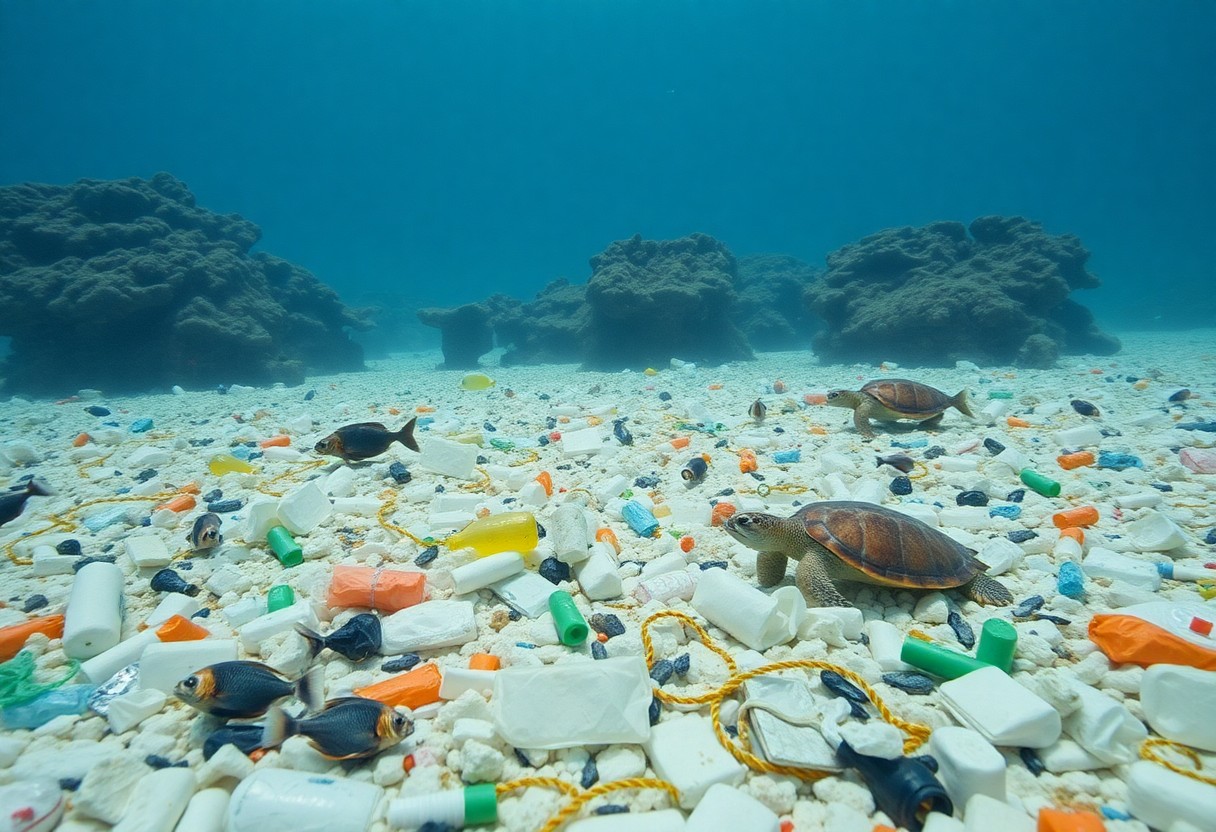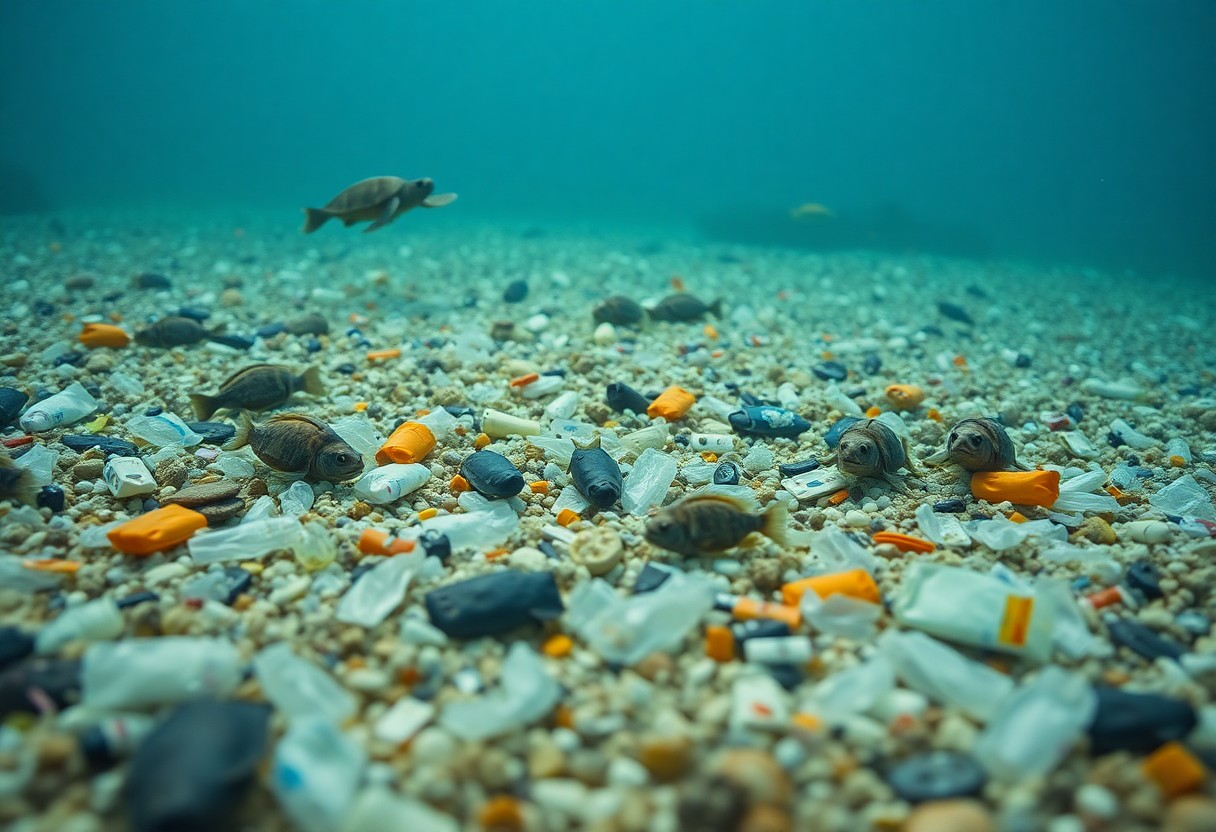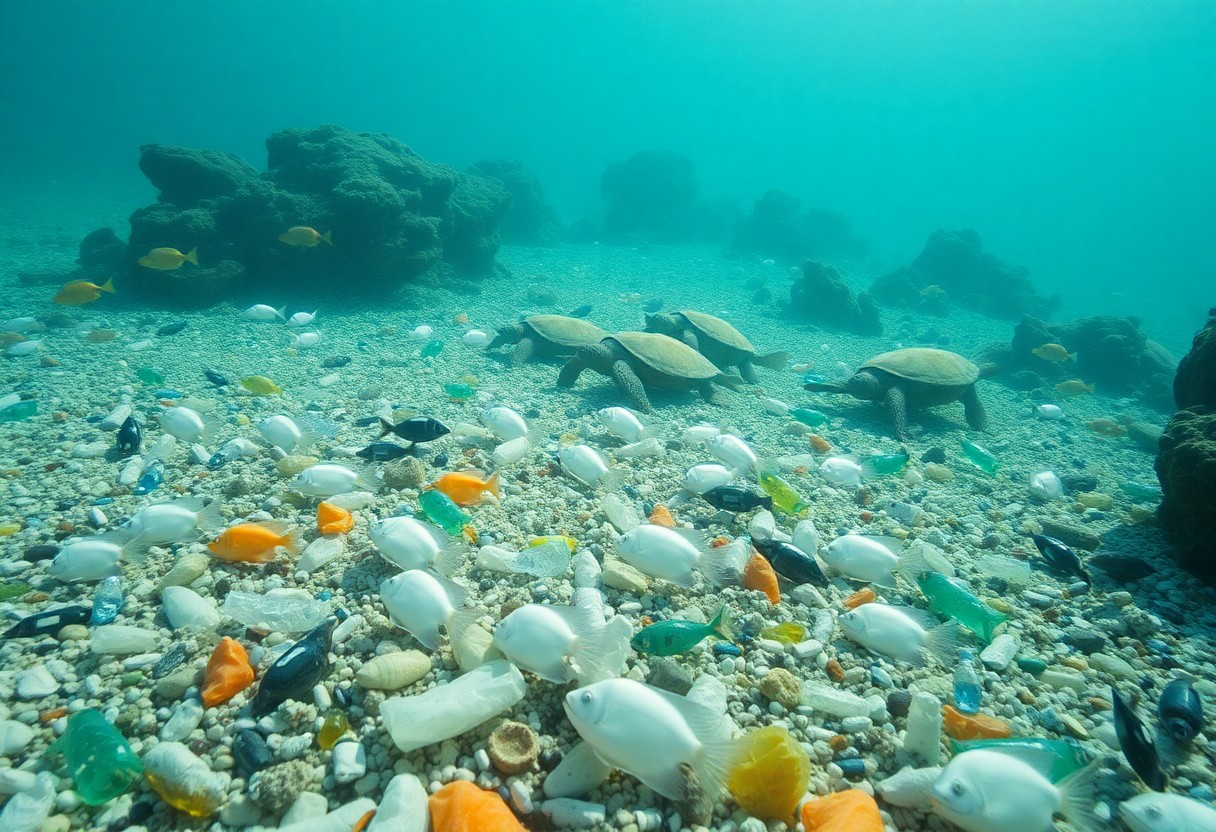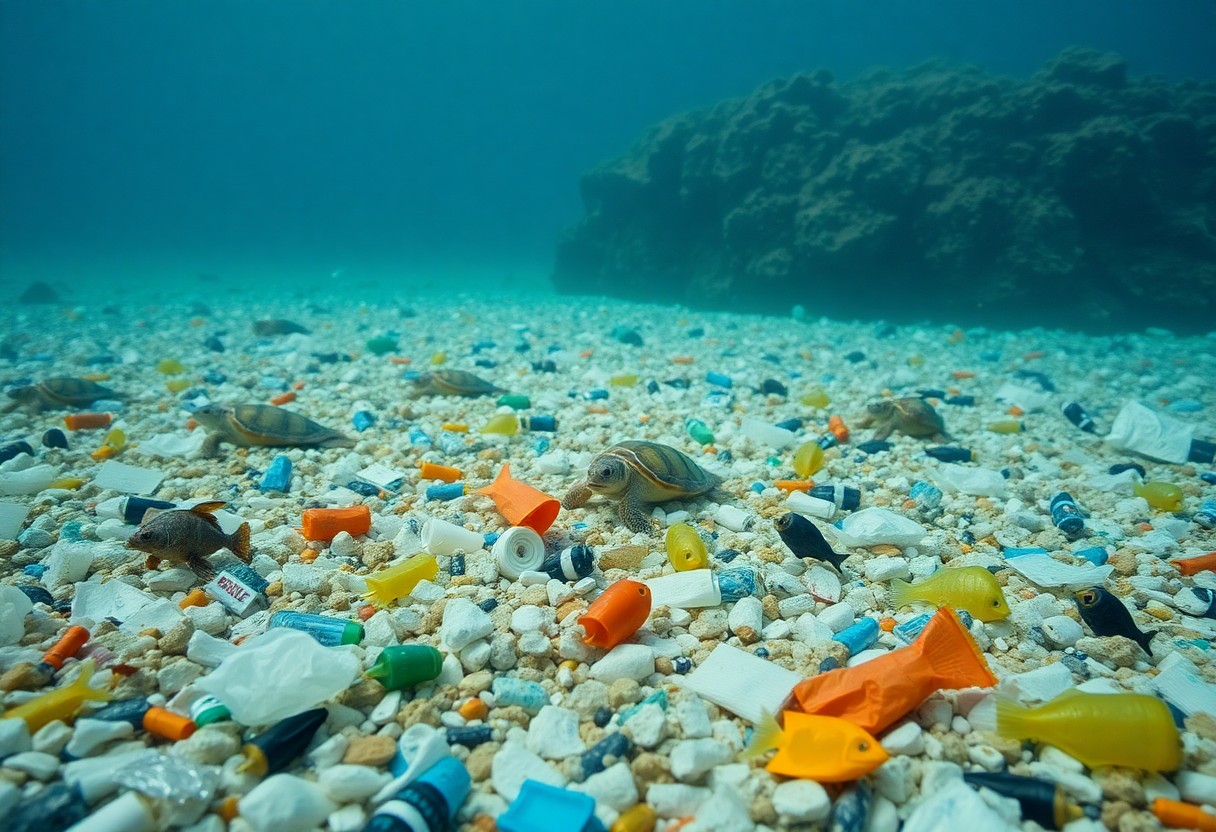With increasing plastic waste in our oceans, it’s vital for you to understand its impact on the marine ecosystem. Plastic pollutants not only threaten marine life but also disrupt the delicate balance within aquatic habitats. Fish, birds, and marine mammals can mistake plastic for food, leading to ingestion and entanglement. Moreover, microplastics and chemical additives can enter the food chain, ultimately affecting human health as well. By being informed, you can contribute to solutions and help protect our oceans for future generations.

Sources of Ocean Plastic Waste
The primary sources of ocean plastic waste include land-based activities, where improper disposal of plastic products leads to them washing into waterways and eventually the ocean. You may find that single-use plastics like bags, bottles, and straws contribute significantly to this problem. Additionally, fishing gear that is abandoned or lost at sea, often referred to as “ghost gear,” poses a major threat to marine life. Moreover, wastewater treatment plants can release microplastics into the ocean, which are often produced from the breakdown of larger plastic items. Your actions in daily life can have a direct impact on this issue.

Types of Ocean Plastic Pollutants
Before diving deeper into the effects, it’s crucial to identify the different types of plastic pollutants that find their way into our oceans. Understanding these types will help you grasp how each affects marine life and your personal responsibility in this matter.
| Type of Plastic Pollutant | Description |
|---|---|
| Microplastics | Tiny plastic particles less than 5mm, often originating from larger plastics breaking down. |
| Single-use Plastics | Items like straws, bags, and bottles discarded after one use, contributing significantly to waste. |
| Fishing Gear | Lost or abandoned nets and traps that can entangle marine animals. |
| Styrofoam | Lightweight and non-biodegradable, often found in food containers and packaging. |
| Cosmetics and Personal Care | Products containing microbeads, small plastic particles used for exfoliation. |
The presence of these types of pollutants significantly alters marine ecosystems, impacting biodiversity and the health of ocean currents.
Effects on Marine Life
A significant consequence of ocean plastic waste is its detrimental impact on marine life. Plastic waste entangles marine animals, disrupts their habits, and alters ecosystems. As a result, many species face habitat loss and declining populations, which can ultimately affect biodiversity and the health of ocean environments. Understanding these effects is important for addressing the broader implications of plastic pollution.
Ingestion and Starvation
Beside disrupting habitats, plastic ingestion poses a severe risk to marine animals. Species such as turtles, seabirds, and fish often mistake plastic items for food, leading to blockages and malnutrition. This behavior not only compromises their health but can also have cascading effects on the food web, influencing predator-prey dynamics.
Toxicity and Chemical Pollution
Above this, plastic waste contributes to toxicity and chemical pollution in marine environments. Plastics absorb harmful contaminants from the ocean, which are then ingested by marine organisms, introducing toxins into their bodies. This process can cause long-lasting health issues, including reproductive problems and developmental disorders, not only in marine animals but also in humans who rely on seafood.
For instance, research has shown that chemicals like BPA and phthalates, which leach from plastics, can accumulate in the tissues of marine life. These toxins may then be transferred through the food chain, impacting larger predators, including humans who consume seafood. This contamination can lead to serious health risks, highlighting the interconnectedness of ocean health and human well-being. By understanding these mechanisms, you can recognize the importance of reducing plastic pollution to safeguard both marine ecosystems and your health.
Impact on Marine Ecosystems
It is imperative to understand that ocean plastic waste significantly disrupts marine ecosystems. Marine organisms interact with plastic debris in various ways, leading to behavioral changes, physical harm, and even death. When plastics accumulate in the oceans, they break down into smaller microplastics, which are ingested by marine life, impacting their health and survival. This cycle of plastic pollution not only affects individual species but also alters entire ecosystems and food webs, making it imperative for you to recognize the urgency of addressing this issue.
Habitat Disruption
To fully comprehend the impact of plastic waste, consider how it disrupts vital habitats. Plastic debris can smother coral reefs and seagrass beds, hindering growth and reproduction. Furthermore, the accumulation of plastics in these ecosystems leads to degraded water quality, threatening the overall health of marine environments. By becoming aware of these effects, you can play a part in conservation efforts that protect these critical habitats.
Biodiversity Loss
Any disruption caused by plastic pollution can ultimately lead to significant biodiversity loss within marine ecosystems. This loss occurs when plastic debris not only affects individual organisms but also compromises the delicate balance between species that thrive within these environments. The introduction of foreign materials can lead to competition for resources, predation, and a decrease in species diversity.
This biodiversity loss is alarming because it weakens the resilience of marine ecosystems. When a variety of species is diminished, ecosystems become more vulnerable to changes such as climate shifts and disease outbreaks. As a result, not only do these changes leave individual species at risk, but they also threaten the overall functionality of marine environments that you might rely on for food and recreation. Understanding this interconnectedness is key to motivating action against ocean plastic waste.
Human Implications
Once again, your daily choices contribute to the mounting issue of plastic waste in oceans. This pollution directly impacts human health and livelihoods, as pollutants take a toll on marine ecosystems. As you consider the importance of protecting biodiversity, it’s vital to understand the broader implications. Explore the issue further through Ocean Plastics Pollution awareness campaigns that highlight the urgent need for change.
Seafood Safety
Any fish or seafood you consume can potentially contain microplastics and toxic chemicals absorbed from polluted waters. The ingestion of these contaminants not only poses health risks to your body but also affects the safety of the food supply chain. Consuming seafood from contaminated areas may lead to serious health issues, as these toxins can accumulate in your system over time.
Economic Consequences
Against the backdrop of rising plastic pollution, your local economies face significant challenges. The fishing and tourism industries, vital to many communities, suffer from declining marine health and environmental degradation. This decline leads to lower fish stocks and deters tourists, impacting jobs and livelihoods.
Implications for the economy are vast, as businesses must adapt to shifting consumer preferences and increased regulations. The cost of cleanup can also burden local governments, diverting funds from vital services. As you ponder your role in this cycle, consider how your choices can drive sustainable practices and promote healthier oceans for future generations.

Solutions and Mitigation Strategies
For addressing ocean plastic waste, a multifaceted approach is necessary, combining policy changes, community action, and innovative cleanup technologies. You can explore how marine life is affected by plastic to better understand the urgency of these solutions.
Policy and Regulation
Solutions must include the implementation of stricter regulations on plastic production and waste management. You can advocate for policies that enforce recycling, reduce single-use plastics, and encourage biodegradable alternatives. Effective legislation can significantly decrease the amount of plastic entering marine environments.
Community Engagement and Cleanup Efforts
Among the most effective ways to combat ocean plastic waste is through community engagement and organized cleanup efforts. You can participate in local beach cleanups, educate others about the impact of plastic pollution, and support initiatives that promote sustainable practices in your community.
Strategies like organizing regular cleanup events and workshops can empower you and your community to take tangible actions against plastic pollution. By collaborating with local environmental organizations, you can harness resources, share knowledge, and mobilize volunteers for a larger impact. Engaging with your community fosters a shared sense of responsibility and stewardship over marine ecosystems, creating a lasting change for future generations.
Final Words
Following this, understanding how ocean plastic waste impacts the marine ecosystem is vital for you to grasp the broader implications of your actions. Your engagement in sustainable practices can help mitigate this issue, as marine life suffers from the ingestion of microplastics and habitat destruction. To deepen your knowledge, consider exploring Plastic pollution in the marine environment – PMC, where you’ll find comprehensive insights on this environmental challenge. Your informed choices today can foster a healthier future for our oceans.



